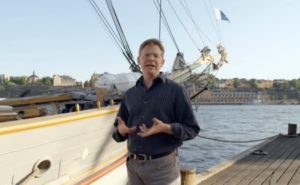
In a new PBS mini-series, a leading libertarian embarks on a worldwide quest in search of functioning markets in education.
Spoiler alert: He doesn’t find many.
But the late Cato Institute scholar Andrew Coulson does find cause for optimism in his swan song, School Inc., as he scans the globe for places where the best schools are free to grow and serve more students.
He examines America’s elite private prep schools, which “have the quality, demand, technology and time to grow into national networks. They just don’t.” Why? They’re more interested in maintaining traditions than scaling up.
He looks at top charter school networks, which are built with scale in mind. But he finds philanthropists don’t consistently back the best. “There’s a lot of scaling up in the charter sector,” he says. “But it’s indiscriminate.”
He heads to South Korea, where extracurricular hagwons turn the best teachers into big-time entrepreneurs, but notes with concern that this marketplace is fueled, in part, by the country’s high-pressure, test-driven college entrance system. He marvels at India’s flourishing low-cost private schools, but laments the rise of government regulations that have forced many of them out of business. He notes Chile’s voucher system and rising achievement scores, but worries school choice has become a target of a Marxist backlash against the legacy of right-wing strongman Augusto Pinochet.
Coulson’s journey brings a much-needed global perspective to the American debate about public education. At almost every turn, he finds politics and bureaucracy sap the energy of educators and entrepreneurs who try to create new and better schools.
Viewers who, like me, often question libertarians’ perspectives on public education can still come away with a clearer idea of where they’re coming from.
“Education was perhaps the only field in which successful entrepreneurship was not celebrated, and so did not flourish,” Coulson concludes. “Where it has begun to thrive in modern times, it is only in exceptional places, where resistance to education-as-a business has lessened.”
Education-as-a-business has taken off in parts of Sweden, he finds, where chains of private schools are preparing expansions across Europe.
And in some places, like Florida, educational freedom need not strictly be a business. Coulson notes the Sunshine State’s laws allow its tax credit scholarship program* to grow continually, as long as donors remain interested in supporting it and students continue to exhaust the supply of scholarships. Companies, acting on their own free will, provide contributions that give disadvantaged families more options.
Therein, he argues, might lie the foundation for a more pluralistic approach to education — one that can accommodate a wide range of belief systems without provoking large-scale conflicts over religion, textbooks or teaching practices.
As for creating an environment where the best educational institutions are free to grow the fastest? That work remains unfinished.
The three-part film series is airing on PBS stations and also available online.
*Step Up For Students, which publishes this blog, helps administer the scholarship program.


